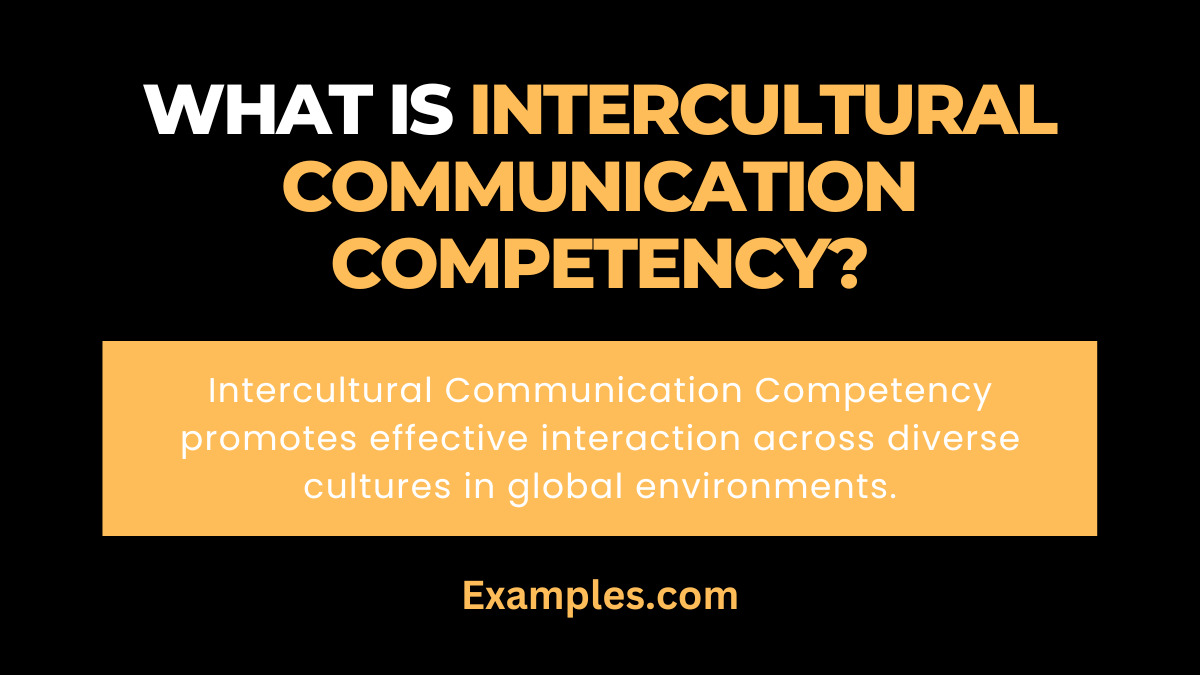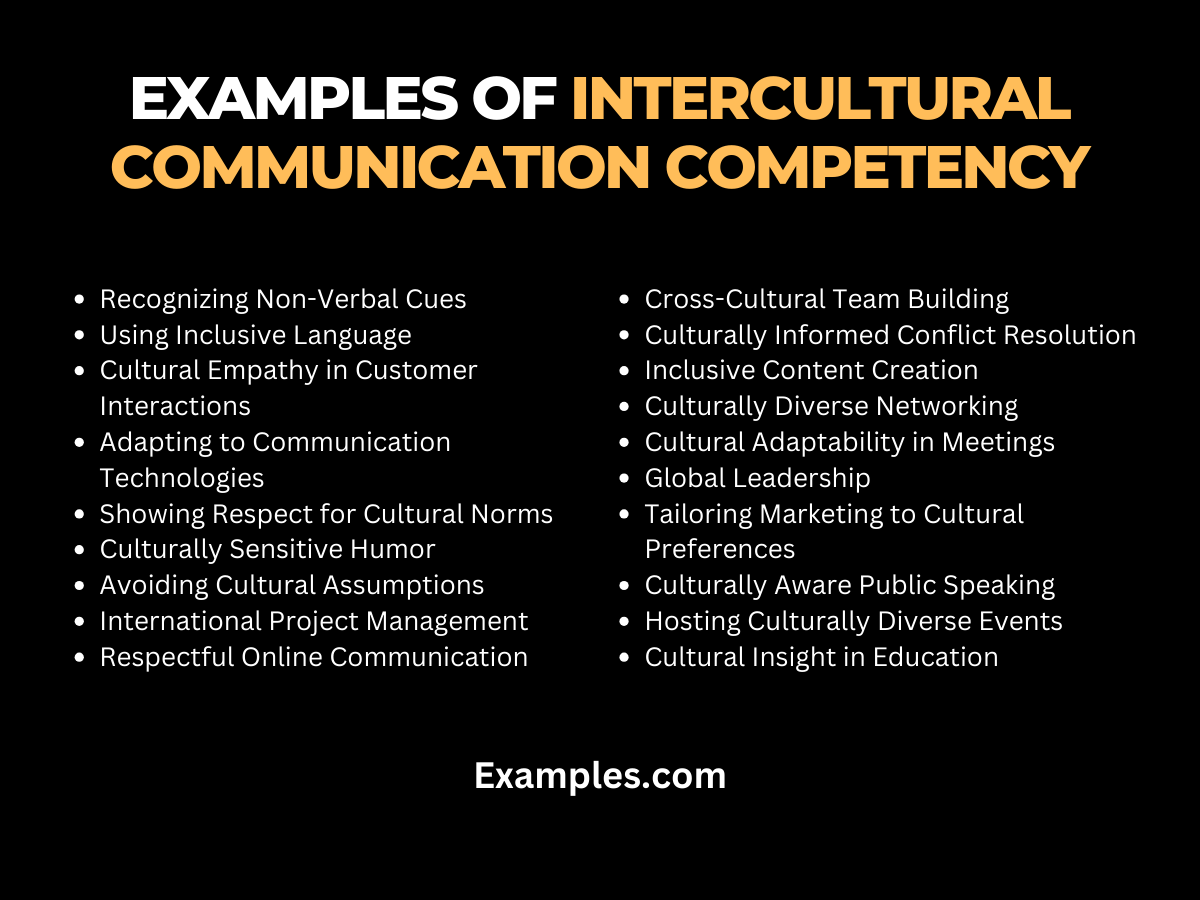19+ Intercultural Communication Competency Examples
Intercultural Communication Competency is an essential skill set in our globalized world, crucial for effective Intercultural Communication. It encompasses the ability to understand, communicate, and interact effectively with people from diverse cultural backgrounds. This competency involves a blend of awareness, knowledge, and skills that are vital for navigating cultural differences, fostering mutual respect, and building strong relationships in both personal and professional settings. Developing these competencies enables individuals to engage in more meaningful and successful intercultural interactions.
What is Intercultural Communication Competency?

Intercultural Communication Competency is the capacity to effectively and appropriately engage in communication processes with people from different cultural backgrounds. It involves understanding cultural diversity, being aware of one’s own cultural worldview, and possessing the skills to adapt communication strategies accordingly. This competency is increasingly important in diverse societies and global business environments, as it facilitates better understanding, reduces misunderstandings, and promotes effective Intercultural Communication.
What is the Best Example of Intercultural Communication Competency?

A quintessential example of Intercultural Communication Competency is evident in multinational corporations where employees interact with colleagues, clients, and stakeholders from various cultural backgrounds. Competency in this context means adapting communication styles, being mindful of cultural sensitivities, and effectively bridging cultural gaps. This ability leads to enhanced teamwork, successful international collaborations, and improved global business relations, exemplifying the practical application and benefits of Intercultural Communication Competency.
20 Examples of Intercultural Communication Competency

Mastering intercultural communication competency is key in our interconnected world. This skill enhances understanding and collaboration across diverse cultural backgrounds, crucial in both personal and professional realms. Proficiency in intercultural communication not only bridges gaps but also enriches interactions, leading to more harmonious and effective exchanges. Here are 20 examples of intercultural communication competency, each with an explanation and communication examples.
1. Recognizing Non-Verbal Cues: Understanding and respecting non-verbal communication differences.
Example: “I noticed your hesitation. In your culture, does silence have a specific meaning?”
2. Using Inclusive Language: Avoiding idioms or colloquialisms that might not be universally understood.
Example: “Let me explain this in simpler terms so we’re all on the same page.”
3. Cultural Empathy in Customer Interactions: Showing empathy to customers from different cultures.
Example: “I appreciate where you’re coming from. Let’s find a solution that works for you.”
4. Adapting to Communication Technologies: Using preferred communication platforms in different cultural contexts.
Example: “Do you prefer email or a messaging app for our discussions?”
5. Showing Respect for Cultural Norms: Demonstrating understanding and respect for diverse cultural norms.
Example: “I understand this is an important tradition in your culture. How can I honor that?”
6. Culturally Sensitive Humor: Being mindful of cultural sensitivities when using humor.
Example: “I want to make sure my joke is appropriate. Is humor like this acceptable in your culture?”
7. Avoiding Cultural Assumptions: Not making assumptions based on someone’s cultural background.
Example: “Rather than assuming, I’d like to ask about your cultural preferences.”
8. International Project Management: Managing projects with sensitivity to cultural time zones and holidays.
Example: “Let’s schedule our meetings considering everyone’s local time and national holidays.”
9. Respectful Online Communication: Communicating respectfully in online forums with international participants.
Example: “I value your input from a global perspective. Can you elaborate more?”
10. Bridging Language Barriers: Using translation tools or services when necessary.
Example: “I’ll use a translator to ensure we both fully understand each other.”
11. Cross-Cultural Team Building: Fostering team spirit in a culturally diverse team.
Example: “Let’s share something about our cultures to build stronger team bonds.”
12. Culturally Informed Conflict Resolution: Resolving misunderstandings with a cultural awareness approach.
Example: “I sense there’s a cultural misunderstanding here. How can we address this together?”
13. Inclusive Content Creation: Developing content that is culturally inclusive and sensitive.
Example: “Is our content respectful and inclusive of all cultural perspectives?”
14. Culturally Diverse Networking: Building a professional network that spans various cultures.
Example: “I’m looking to connect with professionals from different cultural backgrounds. Any suggestions?”
15. Cultural Adaptability in Meetings: Adjusting meeting styles to suit various cultural preferences.
Example: “I know some cultures prefer a formal meeting structure. What works best for everyone?”
16. Global Leadership: Leading with an appreciation for cultural diversity.
Example: “As a leader, I want to ensure all cultural voices are heard and valued.”
17. Tailoring Marketing to Cultural Preferences: Customizing marketing strategies to resonate with different cultures.
Example: “How can we tailor our marketing to be more appealing to your cultural group?”
18. Culturally Aware Public Speaking: Public speaking that is conscious of the cultural diversity in the audience.
Example: “I want to ensure my speech is respectful and engaging for everyone here.”
19. Hosting Culturally Diverse Events: Organizing events that cater to a variety of cultural preferences.
Example: “Let’s include food and activities that reflect our team’s cultural diversity.”
20. Cultural Insight in Education: Educators incorporating cultural perspectives in their teaching.
Example: “I strive to include diverse cultural examples in my lessons.”
These examples highlight the significant role of intercultural communication competency in enhancing mutual understanding and collaboration across different cultures.
Characteristics of Intercultural Communication Competency
Intercultural Communication Competency encompasses key characteristics essential for effective communication across diverse cultures.
- Awareness of One’s Own Culture: Understanding how one’s cultural background influences perceptions and interactions.
- Knowledge of Other Cultures: Familiarity with different cultural norms, values, and practices.
- Empathy: Ability to understand and share the feelings of others from different cultural backgrounds.
- Adaptability: Flexibility in adjusting communication and behavior in diverse cultural settings.
- Effective Listening Skills: Actively listening and accurately interpreting messages in a cross-cultural context.
- Open-mindedness: Being receptive to new cultural experiences and viewpoints.
- Nonverbal Communication Skills: Understanding and appropriately responding to nonverbal cues in different cultures.
- Patience and Perseverance: Exhibiting patience and determination in overcoming intercultural communication challenges.
These characteristics are pivotal in enhancing Intercultural Communication and fostering successful intercultural relationships.
Qualities of Intercultural Communication Competency
Certain qualities are integral to achieving Intercultural Communication Competency, crucial for engaging effectively in a multicultural world.
- Cultural Sensitivity: Being sensitive to and respectful of cultural differences.
- Effective Conflict Resolution: Handling conflicts in a culturally sensitive manner.
- Cultural Intelligence: The ability to interpret and react appropriately to various cultural contexts.
- Interpersonal Skills: Building and maintaining relationships with people from diverse cultures.
- Curiosity and Willingness to Learn: Eager to learn about and from different cultures.
- Effective Language Skills: Proficiency in languages or using language that is clear and understandable.
- Respect for Diversity: Valuing and embracing cultural diversity.
- Self-Reflection: Regularly reflecting on one’s intercultural interactions and learning from them.
Possessing these qualities is essential for anyone seeking to improve their Intercultural Communication Competency.
Importance of Intercultural Communication Competency
Intercultural Communication Competency is increasingly important in our interconnected world for various reasons.
- Enhances Global Collaboration: Facilitates better cooperation and understanding in international teams.
- Improves Cross-Cultural Understanding: Reduces misunderstandings and promotes deeper comprehension of different cultures.
- Boosts Professional Opportunities: Opens doors for international career opportunities and collaborations.
- Strengthens Global Business Relations: Essential for successful global business negotiations and partnerships.
- Fosters Inclusive Work and Social Environments: Creates more inclusive and harmonious workplaces and communities.
- Supports Global Education and Training: Enhances learning experiences in multicultural educational settings.
- Promotes Effective Global Leadership: Key for leaders managing culturally diverse teams.
- Encourages Empathy and Respect: Builds empathy and respect for people from different cultural backgrounds.
The importance of developing Intercultural Communication Competency cannot be overstated, as it is key to thriving in an increasingly diverse world.
Mastering Intercultural Communication Competency is essential for navigating today’s culturally diverse world. This guide has delved into its key characteristics, qualities, and significance, underscoring its vital role in enhancing understanding and collaboration across cultures. Embracing these competencies is crucial for personal and professional growth, fostering effective global interactions, and building a more inclusive and empathetic global community.



